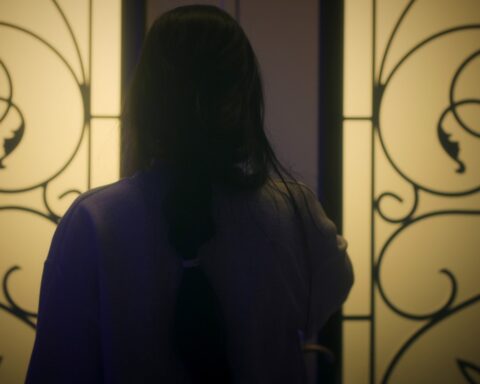The Corporate Coup d’État
(Canada, 90 minutes)
Dir. Fred Peabody
Programme: Special Presentations (Canadian Premiere)
The Corporate Coup d’État isn’t a horror doc, but it methodically builds a sense of impending doom. Its title taken from John Ralston Saul’s writing, featuring Saul and social critic Chris Hedges, Peabody’s film portrays the collapse of democracy in liberal societies.
Hedges and Saul point toward virtually omniscient corporations, which through their control of US politicians from Reagan to Trump, call all the shots behind the scenes. Whatever people need, the corporations maximize share prices, and therefore executive compensation packages, via everything from welfare cuts to the exportation of jobs to low-wage countries.
Deploying feverish montages of collapse and ruin, the film takes viewers on nightmare tours of places like Youngstown, Ohio, and Camden, New Jersey, where the Campbell Soup Company originated, RCA Victor had a plant, and there was a thriving shipyard. Now it’s strictly Desolation Row, a place no one goes unless they are stuck there, one of many “sacrifice zones,” which sounds like something out of a dystopian Sci-Fi fantasy.
Apart from Hedges’ and Saul’s on camera commentary, and various interviews, The Corporate Coup d’État zeroes in on people damaged by what is, in effect, an oligarchy.
A wizened, elderly lady lives with other people in tents on a lot conveniently close to a scrapyard. In a shocker scene, the tents get demolished to the tune of “Happy Days Are Here Again,” a not very subtle allusion to “Make America Great One Again.”
While free traders get rich, there are food shortages and home foreclosures. An abandoned house is still full of belongings after the owner hangs himself in the garage. Steelworkers get shut out of their plant. In one humiliation, workers trained Mexicans to do their jobs, which were outsourced.
The film begins with Barack and Michelle Obama looking glum at Trump’s inauguration. But are they miserable because of the policies that are coming? The film argues that presidents are merely front men for corporate power. In the doc’s most caustic line we are told that Obama was the “smiling, refined black face” while Trump is the “know nothing white face,” a puppet like Clinton with his welfare cuts and Draconian crime bill, backed by Hillary’s comments about “super-predators.”
The film traces the current state of affairs back to Mussolini and his totalitarian idea of Corporatism. It sees the Mussolini-esque Donald Trump as unique only in that he is the most extreme “leader,” a hate-mongerer and Gordon Gekko on steroids, the final functionary in a warped system that could descend into all-out fascism. The corporations tolerate his idiocy because Trump satisfies all their wants. Supporters interviewed in the film think “Trump is trying,” but don’t want him to be brought down because “You don’t want your quarterback to break a leg.”
The bleak prognosis of The Corporate Coup d’État made me think of the worst case scenario of Orwell’s 1984, where the power elite go beyond mere greed. O’Brien, the novel’s embodiment of the oligarchical state, says to Winston Smith, the would-be rebel he is tormenting: “Always there will be the intoxication of power, constantly increasing and constantly growing subtler. Always, at every moment, there will be the thrill of victory, the sensation of trampling on an enemy who is helpless. If you want a picture of the future, imagine a boot stamping on a human face — forever.”
But Peabody does not end his film on that note. One of his interviewees, Cornell West, offers a glimmer of hope:
“We are both wonderful and terrible at the same time. We are both aspirational and visionary on the one hand, we are wretched and oppressive on the other. And the blues understand that. You’ve got to keep track of both poles at the same time. You preserve your hope. You’re a prisoner of hope.”
The Corporate Coup d’État doesn’t amuse you the way Michael Moore’s films do. It takes you to the brink of despair. But it does give you a last minute reprieve, offering the barest possibility of reviving democracy.
Visit the POV Hot Docs Hub for more coverage from this year’s festival!









